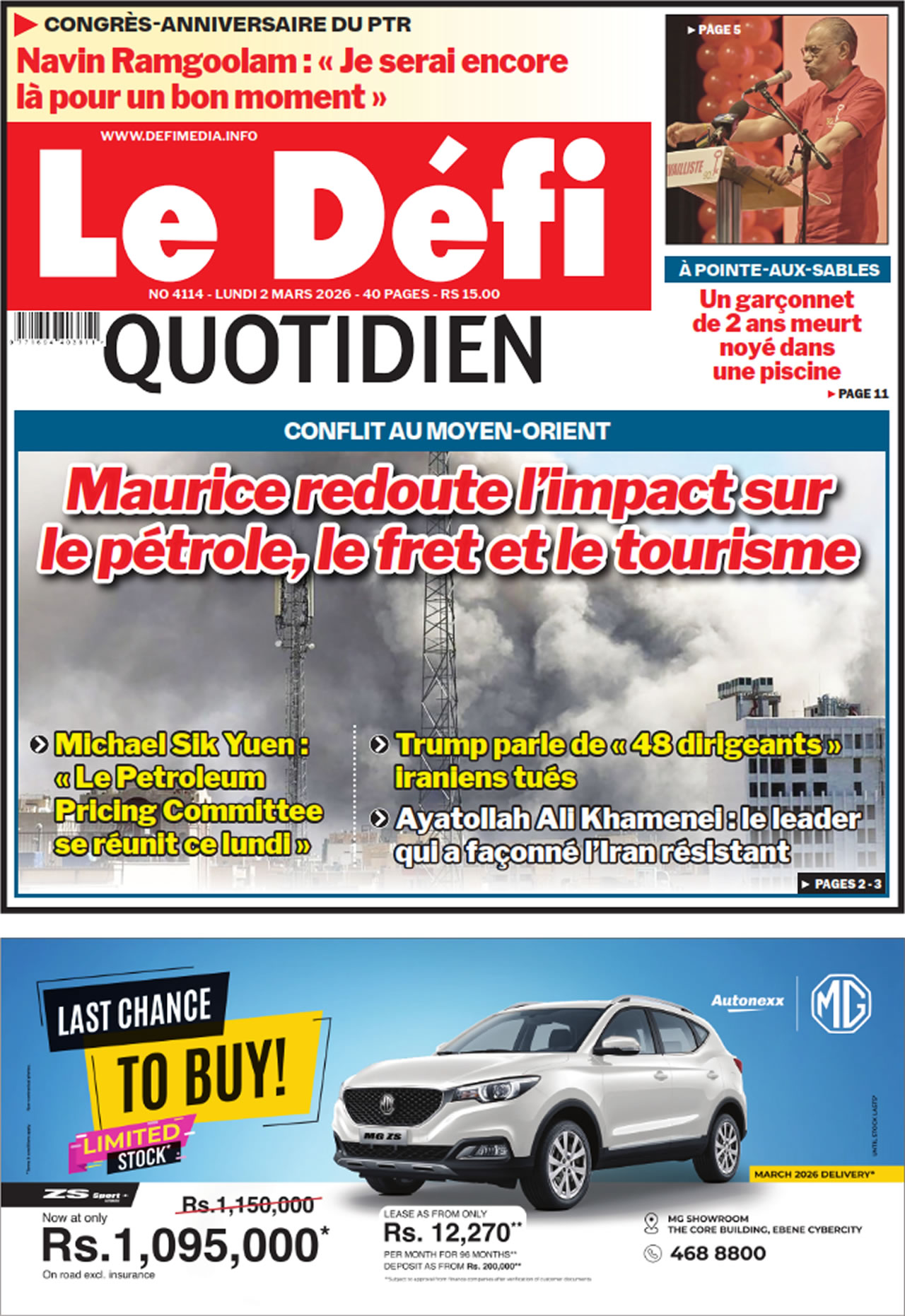
Recruiting 100,000 students by 2020 is one of the main aims for turning our knowledge centres in the pursuit of excellence. As per the definition of Global Higher Education, a knowledge hub is a “designated region intended to attract foreign investment, retain local students, build a regional reputation by providing access to high-quality education and training for both international and domestic students, and create a knowledge-based economy.”
Economies across the world are focusing in building their capacity so as to be able to integrate themselves into the global economy through the acquisition and transmission of knowledge. The African continent alone has a highly volatile student population with more than 380,000 studying abroad. This is an untapped potential for Mauritius to attract these students in our jurisdiction. Being at the crossroads between Africa and Asia, Mauritius is not only concerned about focusing on the African region but it is also targeting countries like India.
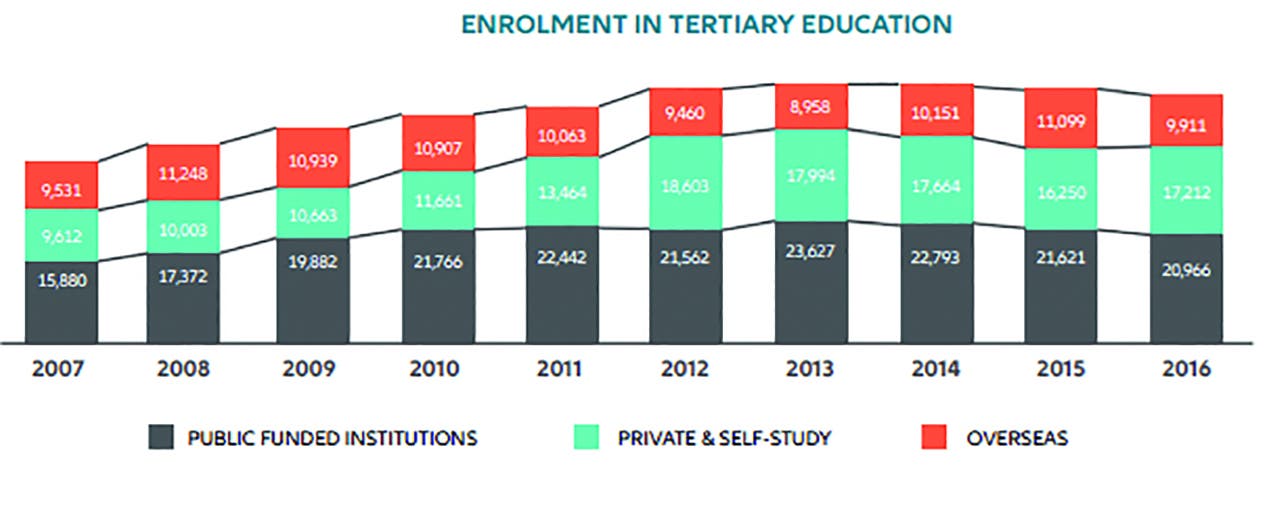
Institutions
As at now, there are ten-publicly-funded institutions operating in Mauritius which include the University of Mauritius (UoM), University of Technology, Mauritius (UTM), Open University of Mauritius (OU), Université des Mascareignes (UdM), the Mauritius Institute of Education (MIE), Mahatma Gandhi Institute (MGI), Rabindranath Tagore Institute (RTI), Fashion and Design Institute (FDI), Mauritius Institute of Training and Development (MITD) and Mauritius Institute of Health (MIH).
On top, there are 54 private institutions registered locally; of these, 37 are fully operational. These institutions provide tertiary education in diverse fields and at different levels, ranging from Certificate to PhD and DBA, with the awarding bodies generally based overseas. In 2016, three of these institutions had the status of International Branch Campuses (Middlesex University and Aberystwyth University, UK and Greenwich University, Pakistan), and two of them had Awarding Power- 1 Degree (Charles Telfair Institute), and 1 Sub-Degree (Rushmore Ltd).
In 2016, a total of 71 overseas awarding bodies were present locally. These awarding bodies were from the following countries: United Kingdom (43), France/Reunion (9), South Africa (8), India (1), Australia (3), Malaysia (3), Europe (1), New Zealand (1), United States of America (1) and Pakistan (1).
Additionally, in Mauritius most of the international chartered bodies are present, such as Association of Chartered Certified Accountants (ACCA), Institute of Chartered Accounts of England and Wales (ICAEW), Chartered Financial Analyst (CFA), Chartered Institute of Management Accountants (CIMA), Association of Chartered Institute of Bankers (ACIB), Institute of Chartered Secretaries and Administrators (ICSA), Microsoft Certified Systems Administrator (MCSA), Cisco Certified Network Associate (CCNA), Cisco Certified Network Engineer (CCNE), Cisco Certified Internetwork Expert (CCIE), Oracle Certified Professional (OCP) and Chartered Institute of Logistics and Transport (CILT).
Total enrolment
In 2016 total enrolment in tertiary education amounted to 48,089. The number of international students has known an upward rising trend over the past 10 years. Mauritius is continuously attracting more and more foreign students, both from the region and the rest of the world. Since 2007, the number of international students has significantly increased, from 528 to reach 2,900 in December 2017.
A majority of the international students (89.3%) are enrolled in the private institutions. Around 1,506 (86.8 %) of the international students were studying at undergraduate level and 230 (13.2 %) were studying at postgraduate levels, including MPhil/PhD. As per statistics, Medicine and Biomedical Science tends to be very popular amongst the international students (692; 39.9 %). Other popular fields of study include Accounting, Finance, International Business, Information Technology, Law and Hotel Management.
SSR Medical College had the highest enrolment for international students (431) in 2016 followed by African Leadership College (277), Anna Medical College and Research Centre (261) and Middlesex (246). University of Mauritius got only 89 international students. Whitefield Business Schools, on its part, got 70 international students from six different countries including UK, Cameroon, Nepal, Pakistan, Congo and Tanzania.
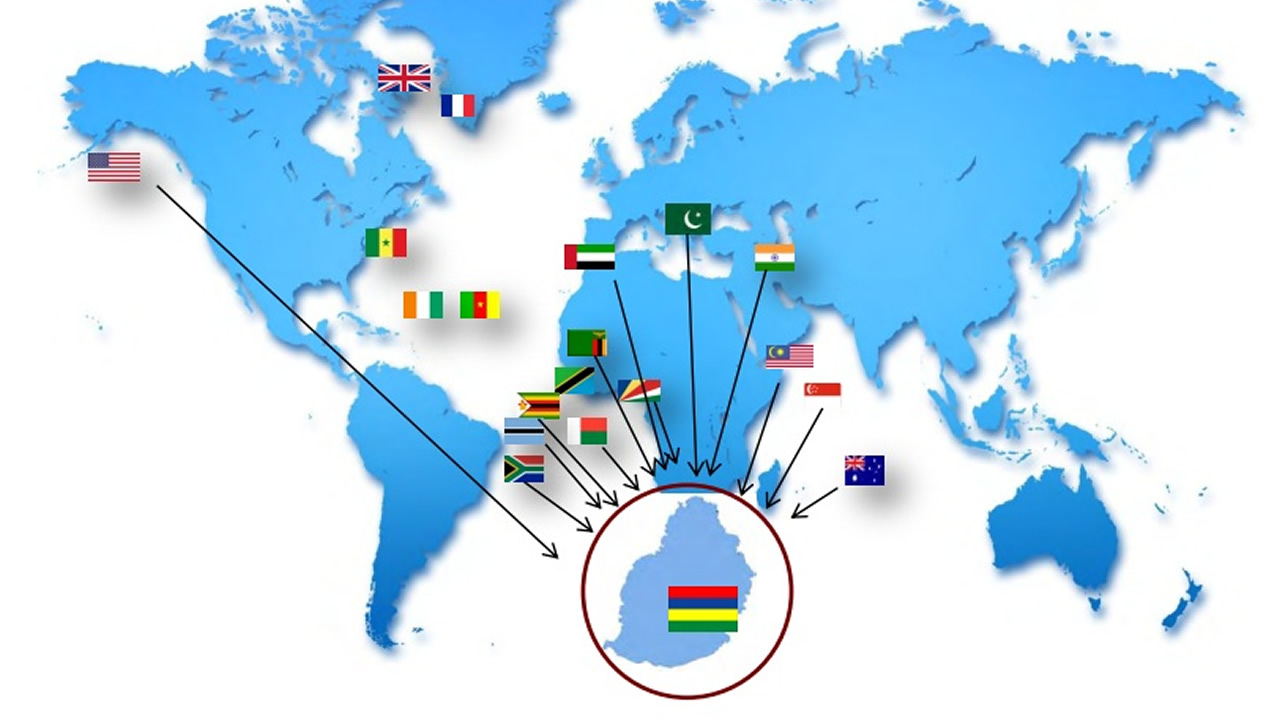
Where do we stand?
Campus Director Middlesex University Mauritius, Professor Mari Jansen Van Rensburg, explains that at a time when social-economic and political insecurity prevails in many parts of the world, “Mauritius is a safe and secure place for foreign students. Leveraging its tradition of excellence, stability and pleasant living environment, Mauritius holds the trump to become the new regional base for education services. It is our opinion that Mauritius is making inroads in becoming part of potential students’ consideration set when selecting a destination to study internationally. Education is a government priority, the country’s proximity and historical ties to Africa, Asia and Europe and the opportunity to study on a tropical island make it an obvious choice for many potential students across the world.”
She states that the mere number of private universities on the island is a clear indication that the international sector considers Mauritius as a growing market. “It is important that Government, the private sector and higher education work together to provide the facilities required. The partnership between Middlesex University and Médine is an excellent example of what can be done to offer world-class education on the island.”
Subheer Ramnoruth, director of Whitefield Business School, reveals that the Education Hub is still in its very early stages. “The foundations are being laid for a brighter future. We are quite far from the goal that has been set but I prefer a slow and managed growth rather than a boom. We are happy with the way it’s progressing. Of course there is room for improvement in many areas and it is also a continuous learning curve for all parties concerned.”
Dr Dhananjay Keskar, Vice Chancellor and Director of Amity Institute of Higher Education, on his part, underlines that Mauritius is certainly but steadily gaining the reputation as an education hub for Africa. “Amity and a number of other local and foreign educational institutions are contributing towards this development.”
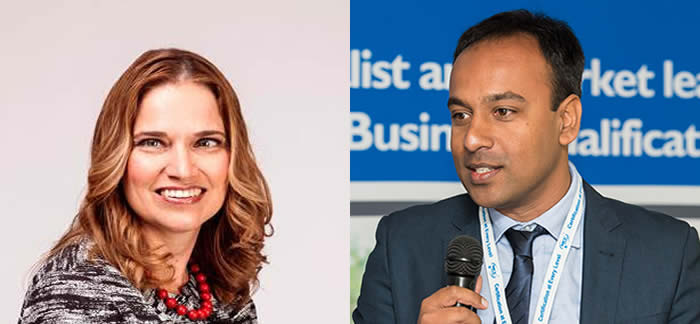
Country of origin
As per statistics from TEC, the international students come from 69 different destinations with the main source countries being India- 503 (29.0 %), South Africa- 231 (13.3 %), Nigeria- 146 (8.4 %), Madagascar- 122 (7.0 %), France- 110 (6.3%), Tanzania- 82 (4.7 %) and Kenya- 79 (4.6%). Most of the Indian and South African students come to Mauritius to study Medicine. Students from France and Madagascar are mostly enrolled for programmes in Hotel Management.

Opportunities
Being strategically located in the Indian Ocean, Mauritius has no doubt various opportunities. Likewise, Mauritius is among the white list countries where there is no danger for terrorist attacks and terror. Besides, our experts unveil other various opportunities for Mauritius.
Ken Poonoosamy underlines that there are various areas where Mauritius is doing very well and can become a centre of excellence for teaching. “For instance, the hospitality sector in Mauritius is reputed to be one of the best in the world. Likewise, Mauritius is surrounded by the sea and has a huge exclusive economic zone.”
He further adds that the major shifts in labour market will require an increase in the numbers of skilled workers, especially with the growing use of modern technology for production in the manufacturing, tourism and food processing industries. “Equal emphasis should be placed on Technical and Vocational Education and Training, and polytechnics.”
For him, we have the potential to make cross-border education a new contributor to the economy and generate significant revenues and jobs. “Mauritius should start positioning itself not only as a destination for higher education but also as a place for secondary schooling and attract international students and, encourage the development of boarding schools.”
For Middlesex Campus Director, the opportunities are endless. “Education affects the level of human capital; human capital determines economic growth; economic growth determines prosperity and has the potential to eradicate inequality.”
Dr Dhananjay Keskar states that we have opportunities to benefit from the education hubs such as Singapore, Malaysia and Dubai. “Mauritius offers a choice of a number of good universities and institutions which have competent faculty and contemporary programs.”
Moreover, the director of Whitefield Business School recalls that since we are at the early stages of this industry’s lifecycle, the opportunities are huge. “I firmly believe that if the private sector and the Government work in close collaboration and provide the right environment, infrastructure and quality education, and tertiary education can become a very important pillar of the Mauritian economy that can contribute massively to economic growth.”
Ken Poonoosamy: “Mauritius has a strong regulatory framework”
According to Ken Poonoosamy, Deputy Chief Executive Officer of Economic Development Board, the government vision is not only to transform Mauritius into an education hub but also position our economy as a provider of high quality education services for international students. “Over the years, the country has crafted its reputation as a quality provider of education at all levels and the island is on the right track to transform itself into a regional hub for world-class higher education. The Government of Mauritius has given a clear signal to the importance of higher education and its role in developing a knowledge-based economy through the setting up of international educational institutions of high repute that will enhance opportunities in terms of education offered as well as its quality.”
He states that Mauritius has a strong regulatory framework for postsecondary education, ensuring the highest level of quality as well as compliance with international norms and standards. “The country is nowadays progressively building its reputation as an education hub and is poised to attract educational institutions of high repute. The Economic Development Board is also encouraging and working with existing institutions to offer programmes in niche areas that will cater to the industry needs as well as those of the region. These areas include creative arts, ocean economy, architecture, FinTech, artificial intelligence, blockchain, biotechnology, and maritime studies, amongst others.”
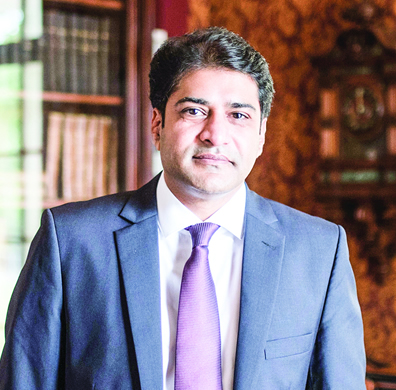 Commenting on efforts of EBD, he adds “the EDB will continue its efforts to work in close collaboration with all stakeholders to develop the right ecosystem for the development of quality education. Interestingly, the Mauritian private sector is showing strong interest to invest in the education sector in Mauritius and the EDB is also working with private sector and developers to facilitate investment projects for the development of tailor-made infrastructure for the education sector. Among such projects are the Uniciti Education Hub, the Beau-Plan Smart City and the Moka Smart City.”
Commenting on efforts of EBD, he adds “the EDB will continue its efforts to work in close collaboration with all stakeholders to develop the right ecosystem for the development of quality education. Interestingly, the Mauritian private sector is showing strong interest to invest in the education sector in Mauritius and the EDB is also working with private sector and developers to facilitate investment projects for the development of tailor-made infrastructure for the education sector. Among such projects are the Uniciti Education Hub, the Beau-Plan Smart City and the Moka Smart City.”
For him, the Mauritian education sector has experienced a rapid growth through dedicated Government initiatives. “A student visa scheme was introduced to encourage international students to study and work on a part-time basis in Mauritius. To further revamp the higher education sector, the Government came up with a new “Higher Education Bill” in December 2017. The new bill is a reformed, modern and appropriate legislative framework whose aim is to ensure better control and regulation of the higher education sector in Mauritius. The bill further provides for the establishment of a Higher Education Commission and a Quality Assurance Authority. The Quality Assurance Authority will promote and maintain quality and sound standards in higher education through appropriate quality assurance mechanisms. In addition, the Government has also launched three new Polytechnics with the objective of running training programmes to serve the emerging needs of Mauritius for a qualified and skilled human resource at mid-professional level in the following areas: nursing, ICT, and travel and tourism.”
Challenges
It is no secret that we are in a very competitive world with so many top universities in various countries. Mauritius has to overcome some of the challenges.
A strong regulatory framework
Middlesex Mauritius Campus director recalls that Mauritius has a strong regulatory framework in the country, but quality assurance of all players should be non-negotiational. “On a community level, we can do more to welcome international students on the island and cater for diverse needs. We already have excellent examples of collaboration between industry, government and HEIs but more platforms are required to share research and work together on national projects to find solutions for socio-economic problems.”
Lack of infrastructure
We do not have world class infrastructure, because for that we also need a critical mass, says Subheer Ramnoruth. “But as the population of international students grows, so will the quality of the infrastructure and the portfolio of courses. I do not want to sound negative, but it remains a fact that there are a few educational institutions that can improve, because not doing so brings a bad name to the sector.”
Threat of fake students
The director of Whitefield Business School highlights that there is the threat of fake students who can use this path to come to the country and this is not always identified at the time of application though we have put in a rigid control system.
Unknown as education hub
Subheer Ramnoruth utters that all concerned parties (public & private) need to work in closer collaboration in a climate of mutual trust and proper communication. “But the biggest remains that we are new and pretty unknown in the world as an education hub. So there is massive work that needs to be done over the next five years to truly position our country as a destination for higher education.”

Skills mismatch
For Ken Poonoosamy, one of the major shortcomings is the skills mismatch that many industries are currently facing. “At the EDB, we are working on schemes that will foster more collaborations and partnerships between academia and industry with a view to identifying adequate industry needs. Since higher education creates a critical mass of high skilled and high value resources, it allows countries that invest intelligently and strategically in higher education to develop new disciplines and areas of specialisation, thus creating new poles of development.”
Low Research and development
Research and development have always been very low in the Mauritian economy with less than 0.5% of the GDP contribution, argues the deputy CEO of EDB. “There is a need to strengthen research in higher education; in that sense, research capacity and availability of high level academics, scientists and researchers are required.”
Air connectivity
Another challenge for deputy CEO of EDB is the air problem of air connectivity. “If Mauritius is to develop itself as a higher education hub and attract foreign students, the problem of air connectivity with Africa should also be addressed. As Mauritius is positioning itself as the springboard between Asia and Africa and developing an education hub, it is imperative that we diversify our destinations and enhance our air traffic flow.”
A multilingual Mauritius
We are living in a cosmopolitan world and there are numerous opportunities, says Ken Poonoosamy. “Mauritius should not continue to remain a bilingual country but should move towards becoming multilingual. This will open up opportunities to attract institutions and students from countries which are not English or French-speaking.”
Consolidating our position
The education sector worldwide is expected to generate around 262 million by 2025 worldwide with 150 million tertiary students. Mauritius has to consolidate its position now to be able to become more competitive. Our experts provide a series of measures to strengthen our position.
Close collaboration
Professor Mari Jansen Van Rensburg reveals that there is need for close collaboration between all stakeholders. “From a marketing perspective, Higher Education Institutions (HEI) cannot only promote their own offerings and joint initiatives are required to position Mauritius as an educational hub.”
Ease procedure and flexibility
The Campus Director of Middlesex Mauritius believes that students should be allowed to stay a bit more after their studies. “From a legislative perspective, the current visa process allows for a fast and effective issue of student visas. The current system is in contrast with other study destinations that offer students an opportunity to look for work after they graduate. For example, the United Arab Emirates recently introduced a five-year student visa to attract more international students. This move follows successes reported by the Australian Government regarding the Post-Study Work Stream Visa. From a public funding perspective, access to research funding remains a problem for private universities.”
The director of Amity Mauritius also avers along the same lines. He utters that based on his experience and feedback from the foreign students, their priority is to have an opportunity to stay back here for at least a couple of years and get employment after completion of undergraduate or postgraduate program. “This facility to stay and work is offered by a number of countries which certainly attracts foreign students. Besides the opportunity to stay back and work, facilities such as good hostel accommodation, bus facility after evening/late hours and medical facility in case of major illness or surgery will also go a long way into consolidating our position as education hub.”
Promote research
Policy makers need to consider that a key performance area for any HEI is the dissemination of knowledge, says Professor Mari Jansen Van Rensburg. “Research furthermore contributes to the position of countries on innovation indexes. Mauritius is currently ranked in the 64th position in the Global Innovation Index. More can be done to support research projects and disseminate knowledge internationally and support is required for both public and private institutions. Finally, it may be useful to consider an academic ranking system for Mauritian Universities, as this may help students to compare and choose.”
Enhancing our quality
Subheer Ramnoruth underscores that contrary to other sectors like tourism for example, the education sector takes time to position itself. “If you look at major universities across the world that have a global appeal, they are hundreds of years old and have been consistent in maintaining a high quality. Along with promoting the country in international forums, we should also keep enhancing our quality, infrastructure and continually streamline our polices as well to make it appealing for international students.”
More Scholarships
Dr Dhananjay Keskar believes that the Mauritius Africa Scholarships is a very good facility for students in Africa and should be promoted actively in African countries. “The students should have a choice to study either in public or private universities. In the past Amity welcomed eight scholars from Uganda in one year under this scholarship scheme. The students have completed their academic programs successfully.”
Aggressive campaigns
According to Ken Poonoosamy the number of flagship and prestigious institutions setting up campuses in Mauritius is increasing. “However, focus should be on quality of institutions targeted. The EDB will carry out more aggressive campaigns to attract some of the most prestigious universities from around the world to set up branch campuses in Mauritius. This will go a long way in building the reputation of Mauritius as a quality destination.”
Developing the right infrastructure and top universities
Transforming the island into an education hub can be accomplished only through the development of the right infrastructure that supports and facilitates the growth of this industry, say the deputy CEO of EDB. “Quality of educational infrastructure should be further improved and the private sector should be encouraged and assisted to invest more in the field of higher education. Top ranked Universities are nowadays setting up branch campuses around the world and this decision is motivated by students’ market potential and also grants provided by host countries. Successful countries include Qatar, Malaysia, UAE and China. Therefore, to give a boost to the sector, more incentives to attract reputed international institutions should be envisaged.”
 J'aime
J'aime














